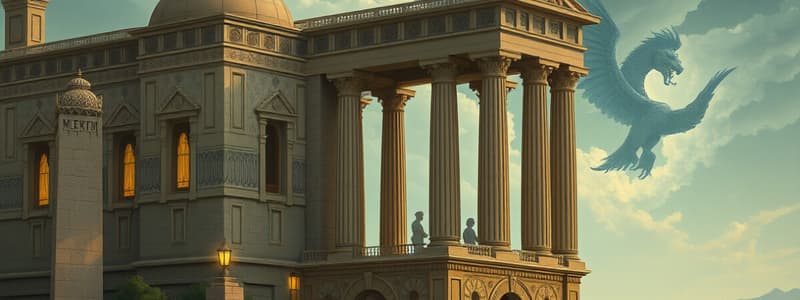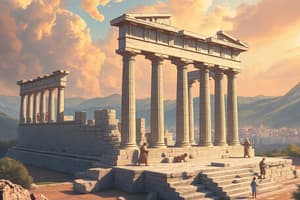Podcast
Questions and Answers
What significant event marked the decline of Athenian dominance in ancient Greece?
What significant event marked the decline of Athenian dominance in ancient Greece?
- The conquest of Persia by Alexander the Great
- The rise of the Mycenaeans
- The foundation of the Academy by Plato
- The Peloponnesian War (correct)
Which government evolution correctly describes the political transition in ancient Greece?
Which government evolution correctly describes the political transition in ancient Greece?
- Democracy → Oligarchy → Monarchy
- Oligarchy → Democracy → Anarchy
- Aristocracy → Monarchy → Oligarchy
- Monarchy → Aristocracy → Oligarchy (correct)
What philosophical approach did Socrates emphasize in his teachings?
What philosophical approach did Socrates emphasize in his teachings?
- The pursuit of pleasure as the highest good
- Trust in sensory perceptions
- Valuing truth and self-knowledge (correct)
- The importance of wealth and power
Which of the following best describes the Hellenistic era?
Which of the following best describes the Hellenistic era?
Who established the Academy, one of the earliest institutions of higher learning?
Who established the Academy, one of the earliest institutions of higher learning?
Flashcards are hidden until you start studying
Study Notes
Early Greece
- Mycenaeans (1400-1200 B.C.) prominent in Greek history, conquering Minoan civilization.
- Led the legendary Trojan War, which is epicized in Homer’s works around 750 B.C.
- Mycenaean civilization declined with the Dorian invasion around 1100 B.C., marking a transition to a new Greek culture.
The Greek City-States
- Government evolved through stages: from Monarchy to Aristocracy to Oligarchy.
- Military strategy centered on the phalanx formation; Sparta emphasized warrior culture and discipline.
- Athens transitioned to limited democracy under Cleisthenes, with notable leadership from Pericles during its golden age.
- The Peloponnesian War concluded with Sparta defeating Athens, which led to the decline of Athenian power.
Greek Thinkers, Artists, and Writers
- Greek philosophers prioritized reason and observation to explore the nature of the universe.
- Socrates emerged as a critical figure, advocating for self-knowledge and truth; his teachings were preserved by Plato.
- Plato founded the Academy, emphasizing ideal forms, while Aristotle established the Lyceum, focusing on empirical study and classification.
- Art and architecture from this period emphasized harmony, proportion, and aesthetics; the Parthenon stands as a prime example.
- Literature flourished with tragedies and comedies, alongside historical documentation by figures such as Herodotus and Thucydides.
Alexander the Great and the Legacy of Greece
- Alexander the Great expanded his empire by conquering Persia and promoting the spread of Greek culture, initiating the Hellenistic era.
- Hellenistic culture synthesized elements from Greek, Persian, Egyptian, and Indian civilizations, creating a rich cultural mosaic.
- Architectural advancements included grand public buildings that celebrated rulers and civic works.
- Significant scientific progress occurred, including developments in mathematics by Pythagoras, astronomy by Aristarchus, physics by Archimedes, and medicine by Hippocrates.
- The enduring legacy of Greek thought, philosophy, and cultural practices continues to shape modern governance, art, and scientific endeavors.
Studying That Suits You
Use AI to generate personalized quizzes and flashcards to suit your learning preferences.




